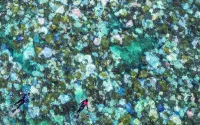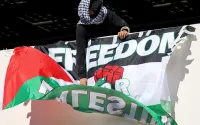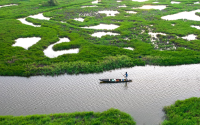20 December 2004Znet / Ha'aretz
A.L., a paratrooper who is serving in Nablus, wrote to me in the wake of my article "Suffer the little children" (Ha'aretz Magazine, December 3). The article described how Israel Defense Forces soldiers shot four children in the Nablus casbah, killing three of them and wounding the fourth, a 3-year-old. Here is the letter, almost in full:"I read your article on Friday, your regular commentary in Ha'aretz, and I felt I had to try to understand your complaint against the IDF. I am serving in the Paratroops Brigade, which is now holding the Nablus sector, manning the Hawara checkpoint, 'back to back,' and doing other initiatives in the nights, which are carried out every day. I have been in this sector for a few months now and I feel tremendous satisfaction every day, when I get up in the morning and know how much I am contributing to the defense of the residents of Israel, who rely on the IDF soldiers who are fighting for them in the territories so that they can go to work safely and send their children to kindergarten safely. That is why the soldiers have tremendous motivation, more than ever before, and a very high [level of] seriousness for kids of 19."Like you, I hold left-wing views that support the evacuation of settlements, but in this period of terrorist attacks it is impossible to leave a sector like this, from which terrorist attacks on Israeli territory originate. I don't understand how you can write that IDF soldiers are killing Palestinian children deliberately. Do you really think soldiers enjoy killing innocent little children who wander the streets of the casbah? Do you think that a kid of 20 enlisted in the Paratroops to kill children? He enlisted to guard the state, period."The situation in this difficult area exacts a price which is not always just. The fact that you believe every word of theirs is a very serious problem of yours. If you accompanied IDF arrest missions and patrols, you would see first-hand how they are carried out in a way intended to hurt only terrorists, and defined firing sectors are assigned so there are no foul-ups in the field. Believe me, no soldier will ever in his life squeeze the trigger when he sees in his optic sight a 12-year-old boy, the same as he was just a few years ago."If you were there, in the field, and saw exactly what happened there, you would understand how much they are lying. If a 12-year-old boy throws an explosive charge, the only thing the IDF can do is attack him and neutralize him, for its deterrent capability in the field for the future. It's clear that foul-ups happen every day in the territories, but the IDF does everything - believe me, everything - to prevent mistakes like that. These children are not innocent. They understand very well how the IDF operates there."I will not descend to the level of responses by officers, who say: In war there are mistakes. But in complex operational activity within a civilian population, it is very difficult not to harm innocent civilians, who are wandering around next to terrorists. I am ready to promise you that if you interview hundreds of soldiers who are serving in the territories, they will tell you that they do not want to hurt innocent civilians and they will do everything to prevent that, except for soldiers who are serving in the territories to hurt innocent people deliberately, because of a sense of revenge. It is impossible to talk about things like that, because they do not represent the army."Every patrol that enters the casbah is not to make our presence felt, but to draw out terrorists and armed wanted individuals and liquidate them, or to create convenient access for initiatives that take place at night. The citizens see these patrols as another instrument of Israel for the occupation and they shoot at the soldiers or throw firebombs at them, and the IDF responds accordingly. Every child there knows very well that if he messes with the IDF by throwing explosives or firebombs, they will try to catch him. The fact that children are hurt in firefights with terrorists in the streets is a problem, but this still has to be done in order to liquidate the wanted individuals who are trying to carry out terrorist attacks every day from Nablus."I hope you will clarify for me your position on the subject, because I really want to understand how articles like this get written in Ha'aretz, which has existed for decades, and that you will prove to me how wrong I am."Dear soldier,It is impossible to do what you are doing in the territories without thinking the way you do. It is impossible to risk yourself every day without feeling "tremendous satisfaction," as you do. You and your buddies would not be capable of doing the job you have been charged with if you were not convinced that what you are doing is overwhelmingly essential and right.It is precisely because at least some of you have principles that you would not be capable of perpetrating what you are perpetrating without the idea being instilled in you that what is permitted to you is forbidden to them. That they and we are not exactly the same thing. That in the name of security you are permitted to do almost anything you fancy, without red lines, including the red line that you do not shoot children, which has long since been crossed.That is why a sophisticated system of education, information, communication, brainwashing, dehumanization and demonization exists, a system that is raising generations of excellent young people who do appalling deeds because they are simply unaware of what they are doing, even the best of them. What the system instills is that we are the lords of the land and the Palestinians are an inferior people who under no circumstances are entitled to what we are entitled to; that the occupation is just, obligatory in the situation, that terrorism sprang up in a vacuum, that the Palestinians were born to kill, that the terrorist attacks stem solely from their bloodthirsty character. And all this is wrapped in security considerations that are an excuse for everything, and believe me - everything.The soldiers have killed 623 children and youths, and you want to tell me that not one soldier saw a child in his gunsight? The person who shot the girl in Rafah didn't see? The person who shot the two youths - Amar Banaat and Montasser Hadada - in the casbah, killing them both with one bullet, didn't see, either, didn't know? And the person who killed 9-year-old Khaled Osta, blasting a huge hole in his chest, he didn't notice, either? And the person who shelled residential buildings in Gaza, who did not see a child through his optic sight, but knew very well that children lived in those buildings, as they do in all the buildings, but nevertheless pressed the button and released the shell? And the pilot who pressed a button and dropped a bomb on a densely populated neighborhood - he too didn't know that children would be among the casualties?And if a child throws a stone at an armored jeep, or even a firebomb, and even an explosive charge, does he therefore deserve to die? You write that he has to be attacked in order to maintain deterrence. That is frightening. To kill a child in order to deter? And if you killed or wounded children in order to deter, have you achieved deterrence?Have you ever thought about why these children are fighting you? Or the adults? Have you ever considered the possibility that they may be fighting for a just cause? That maybe they want to be rid, at long last, of your oppressive presence in their lives? That they have no other way to struggle? Have you ever tried to put yourself in their place, even for a moment? What would you do if you had been born a Palestinian under this occupation? Do you have the courage to say what Ehud Barak did a few years back, "I would have joined a terrorist organization"? There can be no more direct, courageous and true answer than that.You are fighting with tremendous force against children and adults who are struggling with their meager strength for a cause that is the most just of all. They are fighting the occupation. They have no other way to fight it other than the explosive charge and the firebomb. They are fighting the occupation the way our parents and our parents' parents fought a different occupation. Do you ever think about that?History is filled with struggles and wars like this. Young people of your age were sent to die for a cause which is described to them as absolutely vital, life or death, and then one day it's over, the conflict is somehow resolved peacefully as though it never happened, and then everyone asks: Why? What was it all for? You, and certainly your children, will not understand what we did there. Just as the relatives of the soldiers who fell in Lebanon are today asking what we were doing there. What were we killed for? What are we being killed for?What did you do with the best years of your life in the casbah of Nablus, a place that is not yours, while risking your life and the lives of others? By what right did you oppress the population there? By what authority did you decide how they would live, when they would remain inside their homes and when they could go out, when they would work and when they would be idle, when they would be able to get to hospitals and when they would suffer in their homes? Who are we, anyway? What gives us the right? Just because we have force, a great deal of force, are we permitted to do everything?You and your friends have no moral right to be there and certainly not to do what you are doing to the population there. You have no moral right to imprison the population, to enter their homes in the middle of the night, to go from home to home by breaking down walls, to detain people indiscriminately, to destroy, to shoot, to tyrannize and to inflict casualties.One day you will understand in a different light what you are doing there, between Hawara and the casbah, and if you are truly a person of conscience, you will endure sleepless nights, on many nights and for many years. Then you will no longer be able to excuse everything in the name of preserving security, as you are trying to do now. True security for the residents of Tel Aviv will be achieved only when security is achieved for the residents of the casbah, too, and not a minute before. Security, self-respect and freedom - they are entitled to them just as we are. Then - so I believe - your "tremendous satisfaction" will give way to a deep feeling of guilt and a great shame will wash over you for what you wrought there, for what your eyes refused to see.In your heart, I think, you know that the connection between your activity there in the casbah and our security in Tel Aviv is far looser than the way you describe it. You and your buddies prevent one terrorist attack and create the motivation for 100 new attacks, liquidate one wanted individual and produce three new ones to replace him. That is the way of a popular struggle that stems from despair. The boy whose home you turned into a shambles in the dead of night and the parents whom you humiliated before his eyes will never forget, just as you would not forget it if someone did that to you and your family. The friends of Amar, Montasser and Khaled - the children the soldiers shot and killed - will not forgive. They will grow up with hatred that we sowed. They were three children without a present and without a future. Two of them, Amar and Montasser, were orphaned of their fathers. Amar was an only son. They did not deserve to die. True, I did not see with my own eyes what brought about their killing, but I did see what remained after they were killed.And what about you? What memories will you take from there? What will this army service do to your psyche, your personality? What will you tell your children? That their father safeguarded Tel Aviv from the Nablus casbah and liquidated people almost indiscriminately, as you admit in your letter ("Every patrol that enters the casbah is not to make our presence felt but to draw out terrorists and armed wanted individuals and liquidate them")? What has this taught you about the use of force, violence, liquidation of people? If it's permissible there, why not here, too?A person who is given so much power at such a young age cannot help being scarred in his psyche. After you kept old people waiting, prevented the ill from reaching the hospital, stopped children and women about to give birth at checkpoints, the brutal memories will stay with you for all time. Even if you did not delay them and you were the most humane of soldiers, it's enough that they had to get your authorization to go through their cities, enter their houses, to engrave the scars in you. What kind of person will you be when you come home from all this?Not for a minute did I think that IDF soldiers enjoy killing children. But children are being killed. Many children, hundreds of children. And the IDF is not doing enough to prevent this criminal killing. What the IDF is instilling in its soldiers is that there is no choice and that it's not terrible if a child is killed, too. The main thing is our security.The blood of these children cries out to the heavens. Their blood is on our hands. Their blood is on the hands of those who sent you to the casbah and it is on the head of those who shot and it is on the head of those who walk the streets of Nablus armed and tyrannize the residents, and it is also on the head of those who were silent. You are there in my name, too, and therefore we all carry a heavy responsibility, too heavy to bear. Keep doing your thing and safeguard yourself and me; I will go on doing the same.Read original article: Ha'aretz, 4 December 2004






